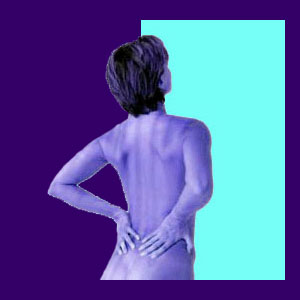
Chronic back muscle pain is an extremely common patient complaint which can be very difficult to accurately diagnose and effectively treat. Most back muscle pain is due to minor back injury or simple overexertion, but some cases are not so easily linked to a definitive causative source. Back muscle strains and sprains are common, but usually get better without any treatment in a few days to a few weeks. Chronic muscular pain is a completely different story, with patients enduring months, years or even decades of agonizing torture.
Muscular pain syndromes, also known as myositis, are among the most prevalent in the anatomy. They can affect virtually any particular region of the body or may be widespread, such as in the case of fibromyalgia.
Medical science is generally preoccupied with linking these mysterious muscular symptoms with anatomical abnormalities, often in the joints or the spine. This unenlightened practice is directly responsible for the horrible treatment results demonstrated for most of these idiopathic pain conditions.
This essay delves into uncovering the truths of chronic muscular back pain syndromes.
Chronic Back Muscle Pain Diagnosis
Patients who are diagnosed with chronic muscular back ache are quite lucky compared to patients who are diagnosed with some underlying structural source of spinal joint pain. However, achieving this diagnosis is a rare event. Chronic muscle aches and pains confound back doctors and are typically grossly mismanaged by the medical professions. Muscle imbalances are sometimes theorized, although this in vogue diagnosis often amounts to little more than smoke and mirrors.
Fibromyalgia is sometimes pronounced, but the medical treatment of this condition remains among the worst and most ineffectual in the entire healthcare field.
Muscle imbalances are also sometimes thought to cause ongoing symptomatic conditions in the soft tissues of the back and neck.
Sometimes, the doctor just does not know what is wrong and this can be a real blessing in disguise. At least the symptoms will not be mistakenly attributed to some innocent irregularity in the spine, as is the rule rather than the exception.
Back Muscle Pain Causes
While injury can create lasting muscle pain, it is very rare. The soft tissues should all heal with proper time and treatment, unless some abnormal condition, like extensive scar tissue formation, exists.
Muscle imbalances and the like can also occur, but are grossly over diagnosed and are seldom the real reason for lasting severe symptoms. In most diagnosed cases I have seen, there is simply no evidence at all of an imbalance.
One of the most prevalent sources of chronic muscular discomfort, which defies accurate diagnosis, is definitely ischemia. This oxygen deprivation syndrome is truly sinister, enacting symptoms without warning and leaving virtually no evidence of the true cause of pain.
Ischemia is rarely identified by the medical industry as being a major contributor to the current back pain epidemic swamping the healthcare community with both the diversity of complaints and the shear number of affected souls. This is surely no coincidence, since the root cause of most oxygen deprivation is a psychosomatic process which flies in the face of conventional Cartesian medical thought. Also not coincidentally is the lack of profit to be had treating mindbody ischemia within the medical sector.
Chronic Back Muscle Pain Conclusions
If you have endured the continual wrong diagnoses or the “sorry, but we really do not know why you still have pain” excuses, there is still hope. In order to beat the symptoms, you must first know where they are originating and what process is generating them. This is more difficult than it first sounds.
Muscular pain without definitive underlying causative process is an enigma. Doctors will look for anything on which to blame the pain, often illogically from a symptomatic viewpoint, as well as from a causative viewpoint. Do not fall into this trap.
If you are diagnosed with a particular condition, be sure to thoroughly understand the theory and research it on your own. Not doing so is like willingly accepting a mistake that may cost you time, functionality or your very life.
Do not forget… If a mistaken causation is accepted, you might be on the fast track towards dangerous and unneeded treatments, including possible back surgery. Don’t let misdiagnosis happen to you. If the diagnosis makes sense, then trust in your care provider and hope that you will defy the odds of back pain treatment and actually find that elusive concept of lasting relief.




